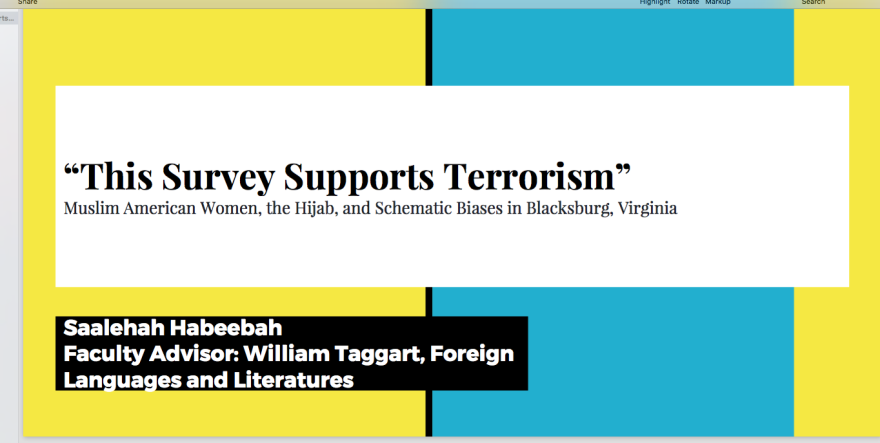It’s no secret that some people hold negative images of Muslim women. Several studies have documented it. But a young Muslim-American woman wanted to know more about what informs those judgments. So she created a survey to explore the reasons why.
Saalehah Habeebah is a junior at Virginia Tech studying environmental science and liberal arts. Her survey on biases against Muslim women grew out of something she does every day: wearing her hijab. And she noticed that wearing her headscarf seemed to make it difficult for strangers to see her as American.
“And not like an other. I’m not from somewhere," says Habeebah. "I’m literally from northern Virginia.”
Habeebah’s survey took an unusual approach. Instead of asking straightforward questions, it sought to uncover unconscious biases in peoples’ minds.
It’s like, for example, if the question were, let’s say, about a doctor. Some might assume the doctor is a man and that subtly affects how they answer a question.
Complicated, yes, and Habeebah says the tactic actually angered some respondents. One negative comment became the title of the survey. It said “This Survey Supports Terrorism.”

"When I posted it on Reddit, someone commented right away and said don’t take the survey -- do not sign up for it. This survey supports terrorism. And I was like, taken aback because that’s ridiculous but it brought anger to so many people."
The survey asked people to identify their political leanings. Professor William Taggart was Habeebah’s mentor.
Taggart says, “I like to say that we found that liberals believe the best and conservatives assume the worst about Muslims and Muslim women.”
In both cases, say Taggart and Habeebah, those opinions were not always based on facts, so there’s a long way to go when it comes to unpacking how people see Muslims in American society.
*********************
The study's abstract:
Muslim American women are often portrayed in American news and entertainment media as victims of a patriarchal society dominated by conservative Islamic forces. The hijab, a head covering worn by some Muslim women, is often viewed as a representation of oppression, and a symbol of opposition to American values.
This study investigates Muslim American women who wear the hijab, and the development of schematic biases towards them. We examine the roots of these biases, and how the current political climate may affect them.
The study focuses on the attitudes, treatment, and experiences towards and of Muslim women in Blacksburg, Virginia, home to one of the largest public research universities in the United States, Virginia Polytechnic Institute and State University.
The population of Blacksburg is especially interesting as the range of political and religious associations and levels of educational attainment vary widely between locals, groups of students, and the university’s faculty and staff. Both qualitative and quantitative data was gathered and analyzed in this study through surveys, questionnaires, and interviews.
Education, political association, and religious association are used as tools in the questionnaires to identify correlations between theses variables and pre-existing biases towards Muslim women. Questionnaires consists of general, situational, and true/false questions, designed to uncover pre-existing schemas and detect biases.
The study found that conservatives were more prone to thinking negatively of Muslims, while in many cases, respondents who describe themselves as “very liberal” tended to think positively about Muslims and Muslim women, even when confronted with negative information that has a basis in fact.
The study also found that most respondents, but not Muslims themselves, viewed Muslim women as victims within Islamic societies. This research study fosters cross-cultural awareness, by bringing to light into the fact that Islamic values can reinforce American values regarding the role of women in society.

